7 Best Healthcare Survey Software to Look Out for in 2025 (Paid+Free)

Healthcare is tricky. Happy patients, quick doctors, and smooth work are key. To do this well, hospitals must know their patients, staff, and others. Surveys can help! By asking questions, hospitals can learn what works and what doesn’t. This helps them make smart choices to improve care, please patients, and run things better.
Healthcare organizations need strong healthcare survey software to conduct effective surveys. The software should handle complex questions, collect data smoothly, and offer clear insights. With a plethora of options available, choosing the right software can be overwhelming. This guide will highlight seven top hospital survey software solutions. We include both paid and free options to fit different budgets and needs.
Whether you’re a small clinic or a large hospital, the right survey software can make a big difference. These tools help healthcare organizations gather important data. With this data, they can improve patient care and enhance overall performance.
Let’s dive in and explore the world of healthcare survey software!
What is Healthcare Survey Software?
Healthcare is all about people. Understanding what patients think, feel, and need is crucial for providing top-notch care. This is where healthcare survey software comes in.
Medical survey software helps hospitals, clinics, and other providers. It collects and analyzes patient feedback. Then, it helps them act on that information. It’s like a listening ear for your patients. You can use it to ask about their experiences. You can also ask about their satisfaction levels. Find out what you can improve.
Imagine trying to understand thousands of patient opinions without software. It would be like trying to find a needle in a haystack! Survey software helps you collect information. It also lets you see trends and make decisions based on data.
Patient satisfaction survey software helps you measure patient satisfaction. It also improves appointment scheduling. This way, you can build better relationships with patients and provide better care.
Best Healthcare Survey Software Glimpse
This table compares seven popular healthcare survey tools. Each one is categorized by its best use for different healthcare needs.
| Online Survey Maker | Best For | |
| SurveySlack | All in One – Create, Share, Check | Website |
| Google Forms | Quick and Simple Surveys | Website |
| Typeform | Engaging Patient Interactions | Website |
| SurveyMonkey | General Purpose Surveys | Website |
| Qualtrics | Complex Analysis and Reporting | Website |
| Zoho Survey | Budget-Friendly Option | Website |
| SurveySparrow | Conversational Surveys | Website |
Let’s Dive in.
SurveySlack (Freemium)
SurveySlack is a powerful and easy-to-use online survey creator platform for healthcare organizations. It helps hospitals, clinics, and other providers collect and analyze patient feedback. The tool helps understand patient experiences and measure satisfaction. It also improves care quality. SurveySlack has a simple design and useful features like AI Survey Questions Generator. It helps healthcare professionals make better decisions and boost patient outcomes.
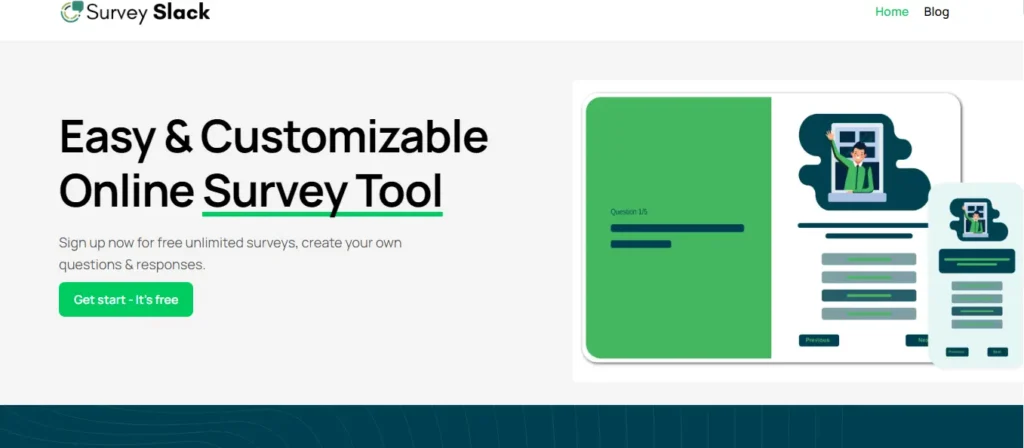
Key Features
- Create tailored surveys to fit your specific needs like Healthcare Employee Satisfaction Survey.
- Make online polls, online forms, and training survey.
- Improve patient satisfaction through personalized communication.
- Get instant insights into patient feedback.
- Powerful tools to uncover trends and patterns.
- Ensure patient data security and privacy.
- Access surveys and results on the go.
- Increase survey response rates.
- Turn feedback into action with clear workflows.
- Compare your performance to industry standards.
Pros
- Easy to use, even for non-technical users.
- Comprehensive suite of features for various survey needs.
- Strong focus on patient experience and satisfaction.
- Real-time reporting for quick insights.
- Customizable surveys to fit specific requirements.
- Secure platform with HIPAA compliance.
- Excellent customer support.
- Integration with popular healthcare systems.
- Cost-effective compared to other survey software options.
- Proven track record in the healthcare industry.
Cons
- Limited advanced analytics features compared to some enterprise-level solutions.
- May have a learning curve for complex survey designs.
Google Forms ( Free)
Google Forms is a free online tool that lets you create surveys and collect data. It’s easy to use and perfect for gathering patient feedback.
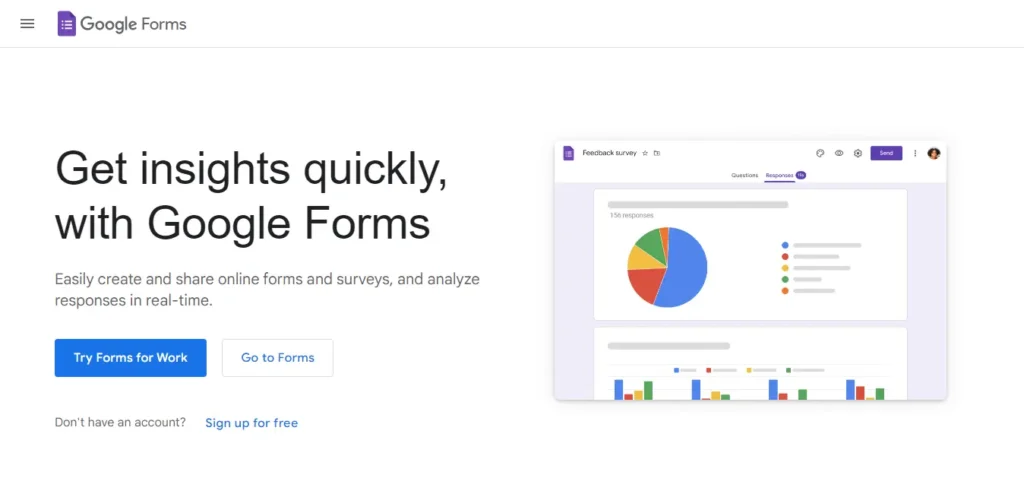
Key Features
- Create surveys without any tech skills.
- No cost to use.
- Works with other Google tools like Sheets for data analysis.
- Add your own look and feel.
- Mobile-friendly patients can fill out surveys on their phones.
Pros
- Easy to learn and use.
- Free to use.
- Integrates with other Google tools.
- Can create different types of questions.
- Collects data quickly.
Cons
- Limited advanced features compared to paid tools.
- Might not be the best choice for large-scale surveys.
Typeform (Freemium)
Typeform is a unique survey tool that makes filling out forms feel like a conversation. It’s perfect for creating engaging and interactive patient surveys.
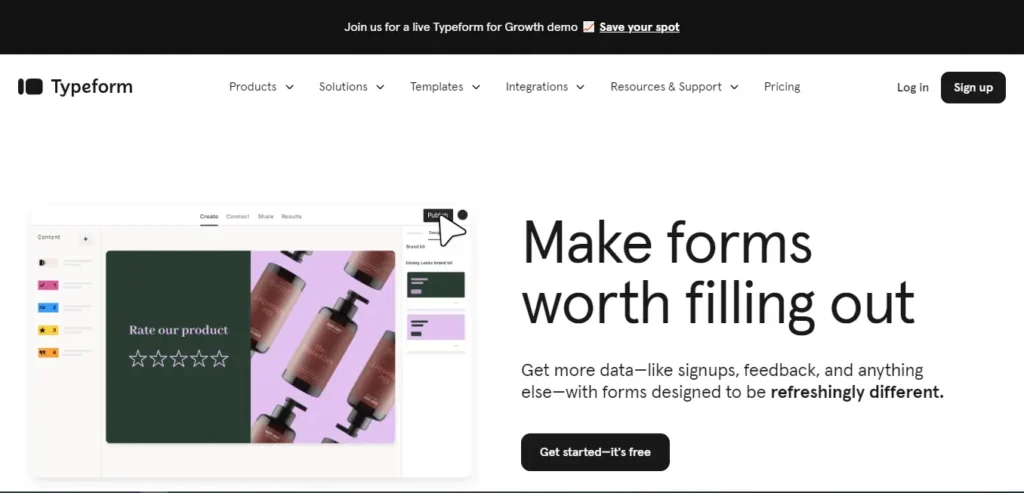
Key Features
- Questions feel like a chat.
- Create surveys that match your brand.
- Tailor questions based on answers.
- Connect with other tools for data analysis.
- Works great on smartphones.
Pros
- Engaging survey experience.
- High completion rates.
- Beautiful designs.
- Valuable insights through logic jumps.
- Easy to share surveys.
Cons
- Pricing can be higher than other options.
- May not have all the advanced features for complex surveys.
SurveyMonkey (Paid)
SurveyMonkey is a popular online survey tool. It has a user-friendly interface and many features. It’s not designed just for healthcare. But it can still be useful for getting feedback from patients.
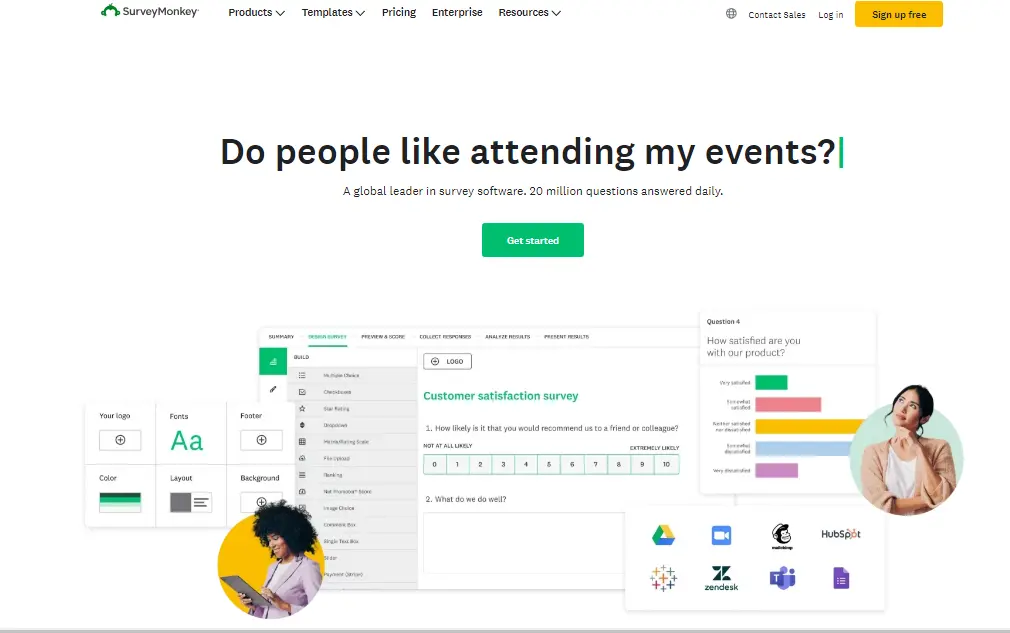
Key Features
- Create diverse surveys to collect different kinds of data.
- Use pre-built templates to save time.
- Basic tools to understand survey results.
- Connect with other tools for deeper insights.
- Reach patients on their smartphones.
Pros
- Easy to use, even for beginners.
- Offers a free plan.
- Large question library.
- Basic data analysis features.
- Wide range of survey types.
Cons
- Might lack advanced features for complex healthcare needs.
- Data privacy features might not be as robust as specialized healthcare software.
Qualtrics (Paid)
Qualtrics is a leading survey platform. It offers powerful tools for collecting and analyzing data. Many healthcare organizations use it to understand patient experiences and improve care.
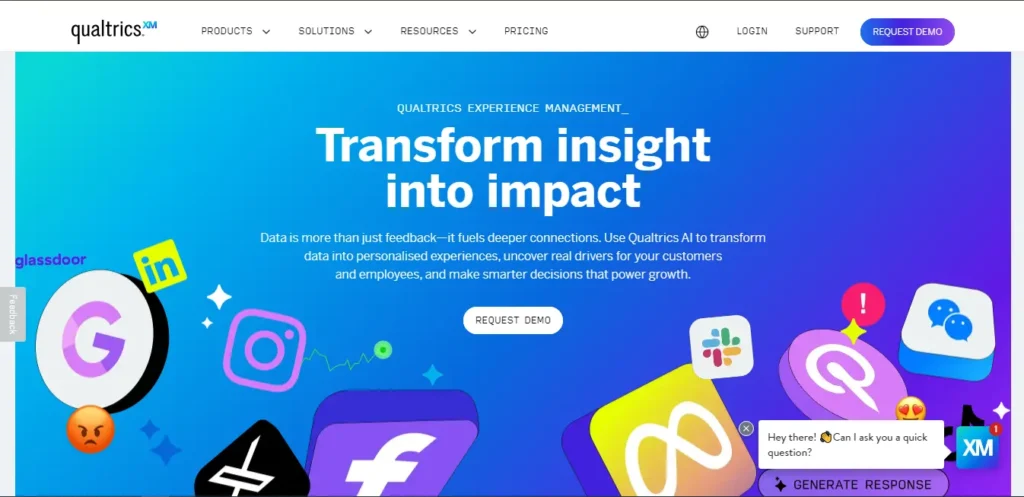
Key Features
- Deep dive into data to uncover hidden insights.
- Create tailored surveys for specific needs.
- Connect with other healthcare systems.
- Understand patient feedback in detail.
- Turn insights into action.
Pros
- Powerful data analysis and reporting.
- Highly customizable platform.
- Strong focus on customer experience.
- Robust integration options.
- Excellent customer support.
Cons
- Can be complex for beginners.
- Pricing can be higher compared to other options.
Zoho Survey (Paid)
Zoho Survey is a versatile online platform for creating and managing surveys. It wasn’t made just for healthcare. However, it does have features that are good for collecting patient feedback.
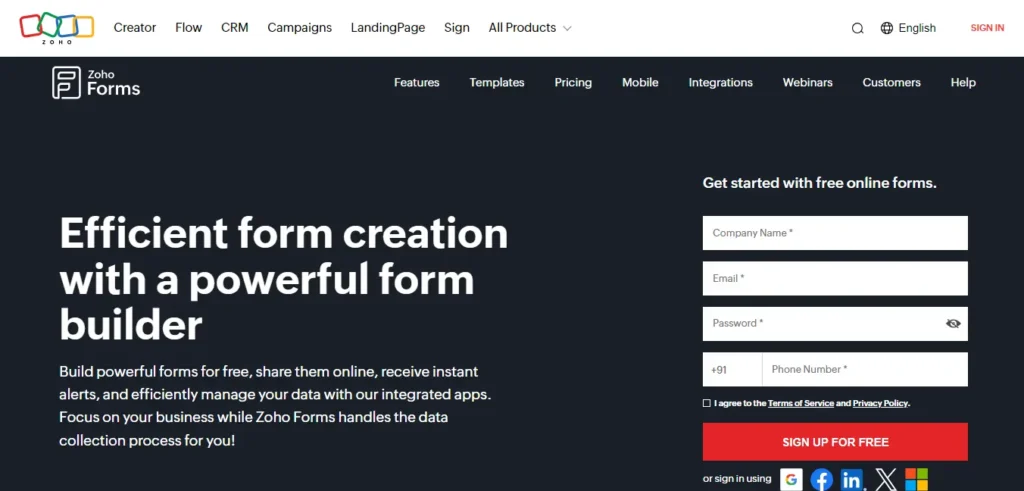
Key Features
- Build surveys tailored to your needs.
- Offer a variety of question formats.
- Generate reports and insights.
- Connect with other Zoho tools and apps.
- Reach patients on their smartphones.
Pros
- Affordable pricing options.
- User-friendly interface.
- Offers a free plan.
- Basic data analysis features.
- Good customer support.
Cons
- Might lack advanced features for complex healthcare research.
- Data privacy features might not be as robust as specialized healthcare software.
SurveySparrow (Paid)
SurveySparrow is a modern survey platform. It aims to create engaging and interactive experiences for patients. It’s designed to help healthcare providers gather valuable feedback and improve patient satisfaction.
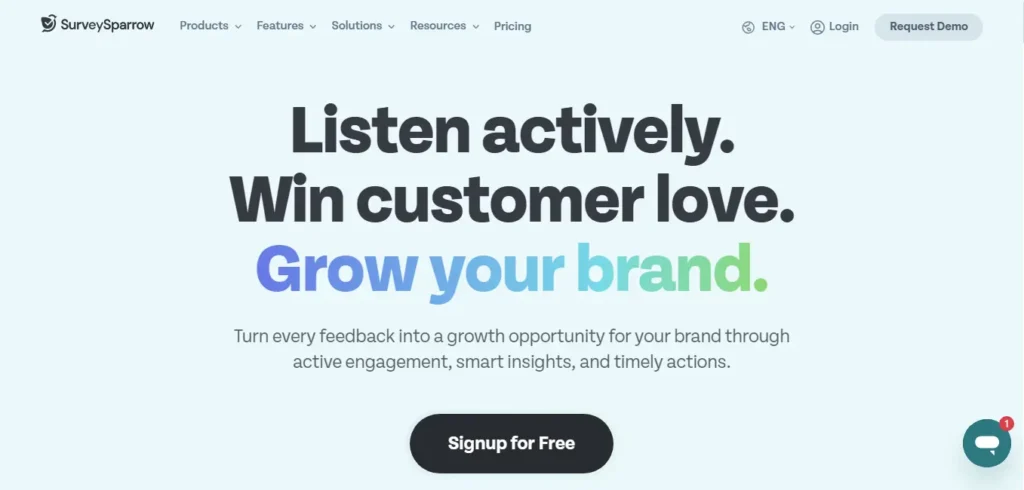
Key Features
- Make surveys feel like a chat.
- Create surveys that match your healthcare brand.
- Tailor questions based on patient answers.
- Connect with other healthcare tools.
- Reach patients on their smartphones.
Pros
- Engaging survey format for higher response rates.
- Customizable to fit your healthcare needs.
- In-depth data analysis and reporting.
- Improves patient experience and satisfaction.
- Strong focus on data privacy and security.
Cons
- Pricing might be higher compared to basic survey tools.
- Learning curve for advanced features.
How to Select Winning Healthcare Survey Software?
Choosing the right healthcare survey software can be overwhelming. Here’s a step-by-step guide to help you make the best decision:
1. Understand Your Needs
First, identify your specific needs. Consider the following:
- Type of Data: Are you gathering feedback from patients? Or measuring employee satisfaction? Maybe you’re collecting data for clinical research?
- Volume of Responses: Will you handle hundreds or thousands of surveys?
- Complexity of Surveys: Do you need basic surveys or advanced, multi-page ones?
2. Ease of Use
The software should be user-friendly for both survey creators and respondents. Look for:
- Intuitive Interface: A clear, easy-to-navigate design helps users get started quickly.
- Customization Options: Make sure you can customize surveys to suit your needs. No technical help required.
3. Features and Capabilities
Choose software with features that enhance your survey experience:
- Question Types: Support for multiple question formats (e.g., multiple-choice, open-ended).
- Branching Logic: Ability to direct respondents to different questions based on their answers.
- Data Analysis Tools: Built-in tools for analyzing responses and generating reports.
4. Data Security and Compliance
Healthcare data is sensitive. Ensure the software complies with relevant regulations:
- HIPAA Compliance: Verify if the software follows HIPAA rules. These rules ensure data protection.
- Encryption: Look for strong data encryption methods to safeguard information.
5. Integration Capabilities
The software should integrate seamlessly with other systems you use:
- Electronic Health Records (EHR): Integration with EHR systems can streamline data collection.
- CRM Systems: Connect with customer relationship management tools for better data utilization.
6. Support and Training
Good support is crucial. Evaluate:
- Customer Service: Look for responsive customer support via chat, phone, or email.
- Training Resources: Training materials and onboarding sessions help users use the software better.
7. Scalability
Choose software that can grow with your needs:
- Flexible Plans: Options for scaling up as your organization grows or needs change.
- Performance: Ensure the software can handle increased data volume and user activity.
8. Cost and Value
Compare pricing models to find the best value:
- Subscription Fees: Look at monthly or annual fees and what’s included.
- Hidden Costs: Watch out for extra costs for features or support.
9. User Reviews and Testimonials
Research user feedback to gauge the software’s performance:
- Ratings and Reviews: Check online reviews and ratings for insights into user satisfaction.
- Case Studies: Look for case studies or testimonials from similar healthcare organizations.
10. Trial Period
Finally, take advantage of trial periods:
- Free Trials: Test the software’s features and usability before committing.
- Pilot Testing: Run a small pilot survey to evaluate its effectiveness and fit for your needs.
What To Do Now
That’s it: Healthcare survey software helps understand patients. By listening to patients, hospitals can make better decisions. This improves patient happiness and hospital work. Choosing the right software needs careful thinking. With good software, hospitals can make patients happier. Start creating your survey without hassle and with a friendly survey maker – SurveySlack.


